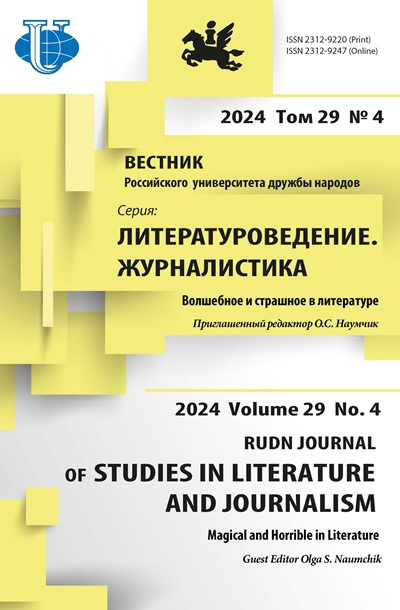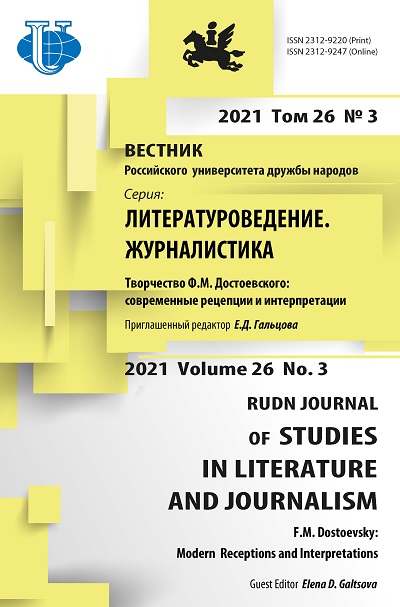Russian Historiosophy of the ХXth Century in the Context of the Tradition of the Moral and Psychological Novel by F. Dostoevsky
- Authors: Petrukhina N.M.1
-
Affiliations:
- Uzbek State University of World Languages
- Issue: Vol 26, No 3 (2021): F.M. DOSTOEVSKY: MODERN RECEPTIONS AND INTERPRETATIONS
- Pages: 363-374
- Section: LITERARY CRITICISM
- URL: https://journals.rudn.ru/literary-criticism/article/view/27639
- DOI: https://doi.org/10.22363/2312-9220-2021-26-3-363-374
Cite item
Full Text
Abstract
The article is devoted to the study of the specifics of the receptive influence of the moral and psychological novel by F. Dostoevsky’s on the development of the Russian historiosophical novel of the XXth century. The relevance of the problem is in the identification of an ideological dominant connected with the key problems associated with the moral attitudes of Dostoevsky's novelistics. The novelty of this study lies in considering, taking into account new ideological assessments of the role and status of a historical person, a historical novel about the narodovoltsy of the 50-60s of the ХХth century. The novels about the narodovoltsy of the 50-60s of ХХth century were chosen as an object of research to reflect the ideological concept of F. Dostoevsky in the receptive field of the searches of the XXth century writers and as a determinant of the moral coordinates of modern phenomena of reality. It is proved that the development of the moral and psychological historical novel in the 60-70s takes place under the strongest influence of the tradition of F. Dostoevsky. The receptive correlation of the genre coordinate system, subjective organization, historiosophical ideologism of the XXth century with the traditions of the moral and psychological historiosophy of Dostoevsky’s “contextual field”, on the one hand, forms a new Tynyanov-Forsh tradition, and on the other, develops the traditions of the writer's polyphonic ideological novel on a new level and determines the expansion of the moral polyphonism of the historical novel in its value and psychoanalytic orientation, when the principle of “internal ethics” begins to dominate the ideological and political fields.
About the authors
Natalia M. Petrukhina
Uzbek State University of World Languages
Author for correspondence.
Email: tatashap@mail.ru
ORCID iD: 0000-0001-9243-2473
Doctor of Philology, Professor, Head of the Department of Russian Literature and Teaching Methods
70/17 m-v Sergeli 7, Tashkent, 700082, UzbekistanReferences
- Pushkin, A.S. (1964). About the folk drama and the drama “Marfa Posadnitsa”. In Complete Works (Vol. 7). Moscow: Nauka Publ. Retrieved March 25, 2021, from http:// pushkin-lit.ru/pushkin/text/articles/article-059.htm (In Russ.)
- Oskockij, V. (1980). Novel and history. Moscow: Hud. lit-ra Publ. (In Russ.)
- On Dostoevsky. Dostoevsky’s works in Russian Thought of 1881–1931: A collection of articles. (1990). Moscow: Kniga Publ. (In Russ.)
- Bogdanova, O.A. (2009). Traditions of the”ideological novel” by F.M. Dostoevsky in Russian prose of the late XIX – early XXth century (Abstract of the Dissertation of the Doctor of Phylological Sciences). Moscow. (In Russ.)
- Forsh, O. Dressed with a stone. Novel. Retrieved May 15, 2019, from http://bookol.ru/prozamain/istori cheskaya_proza/17129.htm (In Russ.)
















